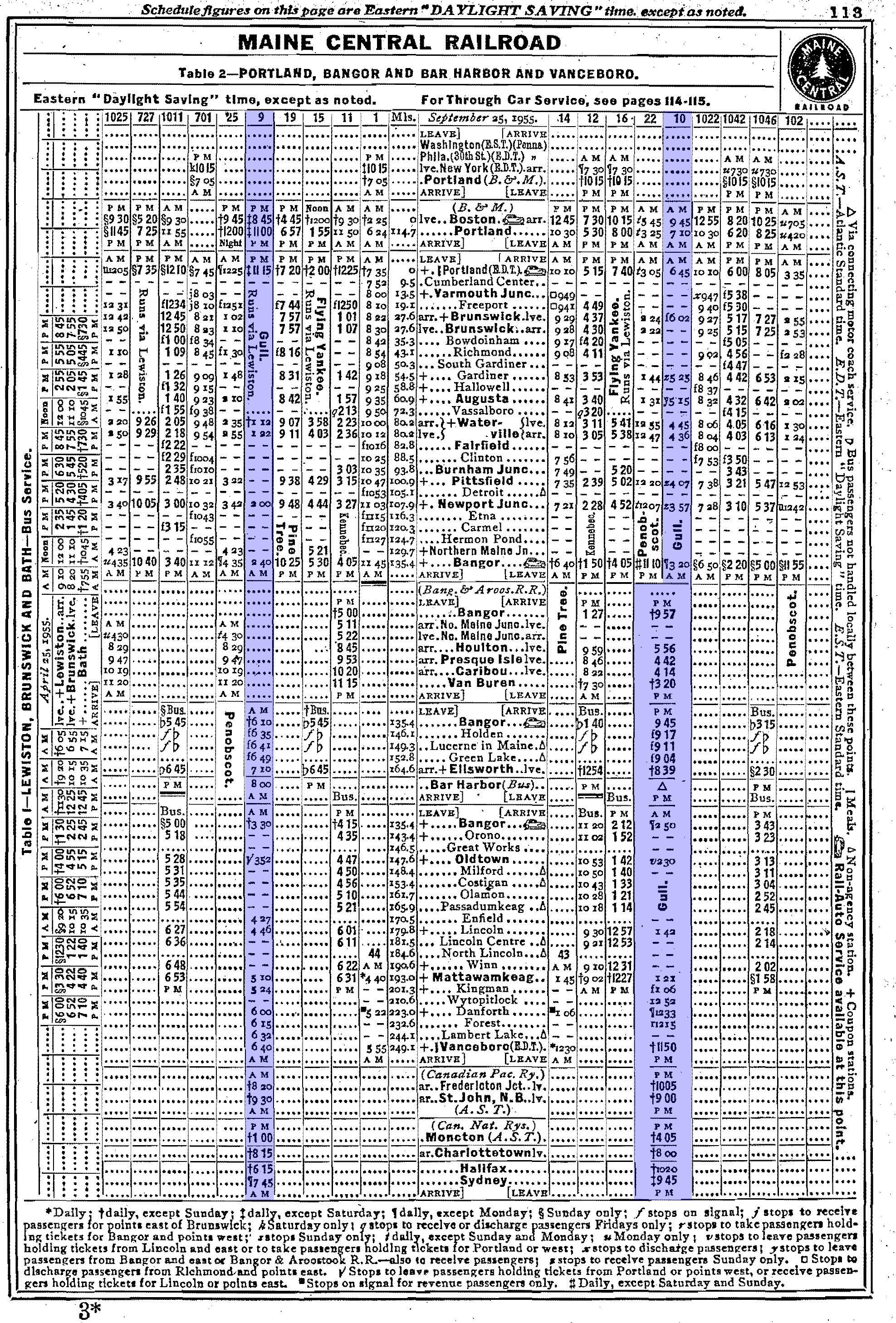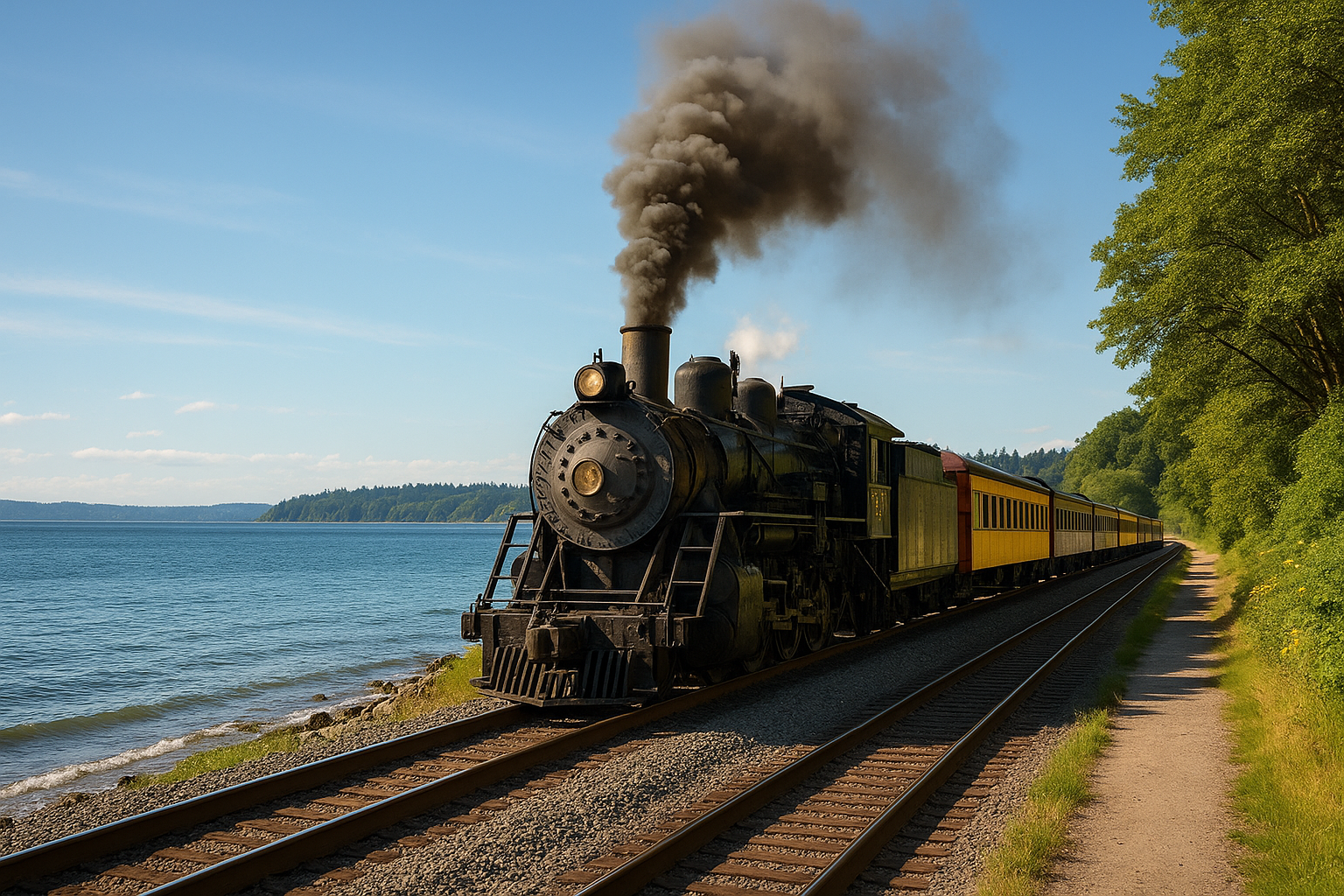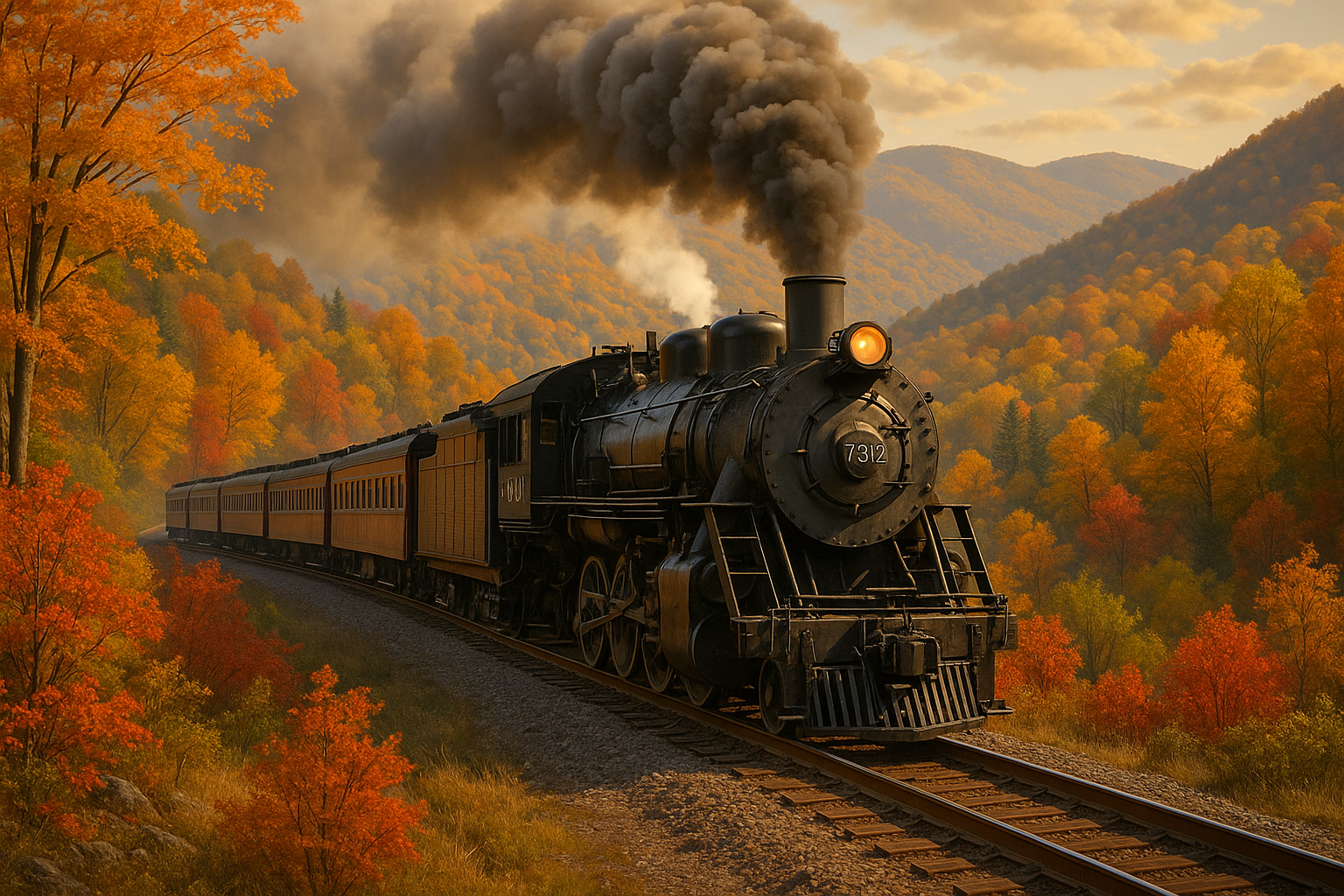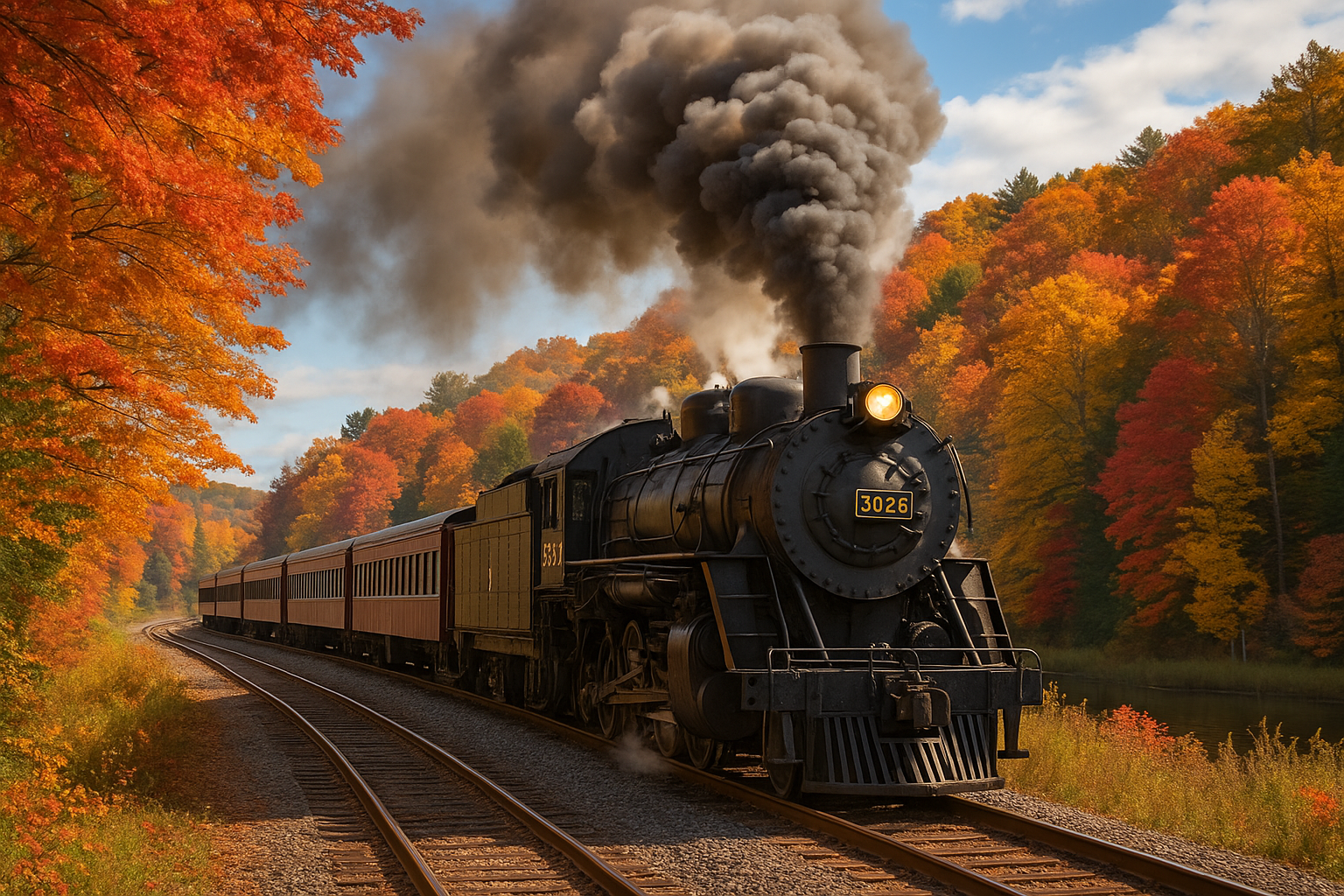The "Gull": A Boston - Halifax, NS Train
Last revised: September 15, 2024
By: Adam Burns
If nothing else the Gull certainly carried an appropriate name. The train skirted the Northern Atlantic coastline throughout much of its journey running from Boston to Halifax, Nova Scotia. It was a joint operation carried out by the Boston & Maine, Maine Central, and Canada's two largest systems; the Canadian National and Canadian Pacific.
There was nothing especially noteworthy regarding the Gull but it did fill a service for many years along its route until the coming of the automobile and airlines witnessed the train's slow decline following World War II.
The Canadian roads were the first to carryout cutbacks while the B&M reduced services to such a degree that its leg was little more than a glorified commuter run. The MEC did its best to keep the Gull respectable but was able to end all services along its network in the early 1960s.
Route
According to Kevin Holland's book, "Passenger Trains Of New England, In The Streamline Era," the Gull was:
"...more a varied assemblage of through cars than an entire through train, linking Boston's North Station with Halifax, Nova Scotia, and other points within Canada's Atlantic provinces."
It traveled a route spanning 732 miles; the eastbound run left Boston late in the evening and arrived at its destination 23 hours later (the train switched time zones to Atlantic Time around Saint John, New Brunswick). Its westbound counterpart left Halifax early in the morning, arriving back at North Station the next day.
Railroads Involved
The Gull was handled by the following railroads; the B&M between Boston-Portland, Maine Central from Portland to Vanceboro (near the Maine border), Canadian Pacific between Vanceboro and Saint John, and finally the Canadian National from Saint John to Halifax.
As an overnight train Pullman/sleeper service was available on the eastbound run between:
- Boston-Bangor (via Lewiston)
- Boston-Calais (via Lewiston)
- Boston-Van Buren (via Lewiston)
- Boston-Saint John (via Lewiston)
- Boston-Halifax (via Lewiston)
- Truro (Nova Scotia)-Sydney (this was a non-Pullman sleeper operated by the Canadian National).
This train also provided a parlor-restaurant-lounge between Boston and Portland and a parlor-café from Saint John to Moncton, a diner from Moncton (New Brunswick) to Halifax, and coaches the entire way.
Accommodations
Since dining was not available the entire trip, Canadian Pacific provided Nova Scotia-bound passengers the opportunity of a stopover at McAdam where breakfast was served in the depot's dining area, usually lasting 20 to 30 minutes.
The westbound Gull provided similar accommodations including Pullman service between Saint John-Boston (via Augusta), Halifax-Boston (via Augusta), Calais-Boston (via Augusta), Van Buren-Boston (via Augusta), and a CN-operated sleeper from Sydney to Truro.
Additionally, a parlor-café was available from Moncton to Saint John, a parlor-buffet-lounge between Saint John-Vanceboro, and a parlor-restaurant-lounge from Portland to Boston. Finally, a standard diner was included from Halifax to Moncton and coaches ran the entire way via Augusta with a changeover at Saint John.
Consist (September 25, 1955)
The entire above-noted consist information is from the Gull's 1941 operations. Interestingly, for all of its services only a single, reserved 10-1-2 Pullman sleeper ran through the entire way providing credence to Mr. Holland's statement the train was really just a mishmash of cars running together between Boston and Halifax.
This lone through sleeper was discontinued after the early 1950s. Following this change the furthest one could travel by rail - without changing cars -was the 454-mile leg from Boston to Saint John.
You may note the "via Augusta" and "via Lewiston" statements; this occurred during the MEC's leg, which operated the westbound Gull via its "Lower Road" main line through Augusta while utilizing the "Back Road" through Lewiston on the return eastbound run.
Timetable (September 28, 1941)
| Read Down Time/Leave (Train #23/Boston & Maine) | Milepost | Location | Read Up Time/Arrive (Train #8/Boston & Maine) |
|---|---|---|---|
| 9:30 PM (Dp) | 0.0 | 6:52 AM (Ar) | |
| 26.0 | 6:18 AM | ||
| 32.9 | 6:07 AM | ||
| 10:54 PM | 67.1 | 5:26 AM (Ar) | |
| 11:55 PM (Ar) | 114.7 | 4:25 AM (Dp) | |
| Time/Leave (Maine Central) | Milepost | Location | Time/Arrive (Maine Central) |
| 12:05 AM (Dp) | 114.7 | 4:05 AM (Ar) | |
| 7:25 AM (Ar) | 363.8 | 9:25 PM (Dp) | |
| Time/Leave (Canadian Pacific) | Milepost | Location | Time/Arrive (Canadian Pacific) |
| 7:45 AM (Dp) | 363.8 | 9:05 PM (Ar) | |
| 8:00 AM (Ar) | 369.7 | 8:50 PM (Dp) | |
| 8:25 AM (Dp) | 369.7 | 8:25 PM (Ar) | |
| 8:55 AM | 389.0 | F 7:52 PM | |
| F 9:17 AM | 406.4 | ||
| 9:22 AM (Ar) | 409.7 | 7:15 PM (Dp) | |
| 9:30 AM (Dp) | 409.7 | 6:45 PM (Ar) | |
| 10:10 AM (Ar) | 431.9 | 6:05 PM (Dp) | |
| 9:42 AM (Ar) | 417.2 | 5:54 PM | |
| 419.9 | F 5:49 PM | ||
| 425.9 | F 5:37 PM | ||
| 10:01 AM | 430.3 | 5:27 PM | |
| 10:16 AM | 440.1 | 5:00 PM | |
| 10:24 AM | 444.2 | 4:46 PM | |
| 10:40 AM | 451.9 | 4:25 PM | |
| 10:50 AM (Ar) | 454.1 | 6:00 PM (Dp) | |
| Time/Leave (Canadian National) | Milepost | Location | Time/Arrive (Canadian National) |
| 12:15 PM (Dp) | 454.1 | 6:05 PM (Ar) | |
| 12:53 PM (Ar) | 476.1 | 5:20 PM (Dp) | |
| 1:31 PM | 497.8 | 4:39 PM | |
| 2:05 PM | 520.5 | 4:05 PM | |
| 2:45 PM | 543.4 | 3:25 PM | |
| 4:22 PM | 570.0 | 1:47 PM | |
| 4:45 PM | 581.5 | 1:20 PM | |
| 5:02 PM | 591.3 | 1:00 PM | |
| 5:35 PM | 608.6 | 12:28 PM | |
| 6:07 PM | 621.4 | 11:57 AM | |
| 6:59 PM | 651.1 | 11:08 AM | |
| 7:35 PM | 668.1 | 10:35 AM | |
| 8:23 PM | 685.5 | 8:22 AM | |
| 8:29 PM | 690.0 | 8:12 AM | |
| 9:50 PM (Ar) | 732.2 | 8:45 AM (Dp) |
During the mid-1950s some lightweight equipment began appearing within the train's consist such as 6-4-6 sleepers and the B&M's Beach series cars (Pullman-Standard). As ridership slipped away the train subsisted on mail and express traffic, carrying several head-end cars within its consist for this service.
The MEC suprisingly continued to enjoy profitability through this traffic although other partnering roads could not claim such good fortunes. Mr. Holland's book notes the Gull witnessed many cutbacks in service after 1959.
The B&M, through new president Patrick McGinnis, was convinced of the new Rail Diesel Car's viability - especially to reduce operational expenses - and ordered a massive fleet for its remaining passenger operations. This included the Gull, which first ran with RDCs as of July 12, 1959.
Timetable (September 25, 1955)

Final Years
It can be argued that, despite intentions to the contrary, McGinnis only hastened the end of passenger service on his railroad. His efforts left the train with conventional equipment only between Portland and Saint John.
For some time the Canadian roads had been losing interest in the service with the CP discontinuing its segment entirely after October 25, 1959. This move left only the Maine Central's portion still in service.
This final remnant quietly disappeared after September 6, 1960 following the MEC cessation of all service across its system. As it turns out the Gull's primary competitor was the airplane, which could make the quick jaunt between Boston and Nova Scotia far quicker than by rail.
Sources
- Holland, Kevin J. Passenger Trains Of Northern New England, In The Streamline Era. Lynchburg: TLC Publishing, 2004.
- Lamb, Kaye W. History Of The Canadian Pacific Railway. New York: Macmillan Publishing Company, 1977.
- Murray, Tom. Canadian National Railway. St. Paul: MBI Publishing Company, 2004.
- Schafer, Mike. Classic American Railroads. Osceola: MBI Publishing, 1996.
- Stevens, G.R. History Of The Canadian National Railways. New York: The Macmillan Company, 1973.
Recent Articles
-
Washington's Whiskey Train Rides
Jul 10, 25 03:06 PM
Climb aboard the Mt. Rainier Scenic Railroad for a whiskey tasting adventure by train! -
Maryland's Whiskey Train Rides
Jul 10, 25 01:05 PM
You can enjoy whiskey tasting by train at just one location in Maryland, the popular Western Maryland Scenic Railroad based in Cumberland. -
Connecticut's Whiskey Train Rides
Jul 10, 25 11:03 AM
In this article, we'll take a closer look at these special train rides, explore the magic behind them, and offer tips for anyone looking to embark on this memorable journey.


